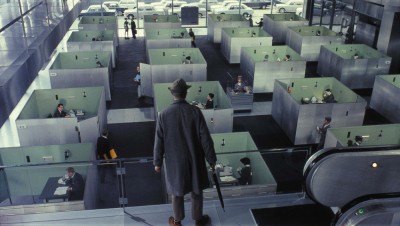Playtime
Plays at Cinematheque September 21
Have you ever watched a classic movie, one of those universally-beloved films considered part of the pantheon of cinema, and thought to yourself, “Am I missing something?”
It’s happened to me a few times, but never to the extent it has with Jacques Tati’s 1967 film Playtime. Jonathan Rosenbaum calls it his favourite movie, period. Roger Ebert compared it to 2001: A Space Odyssey in its singular brilliance. I can’t find a single critic who disagrees with them. But … I just don’t get it.
It’s doubly weird, because Playtime seems tailor-made to my tastes. It’s a sharply satirical comedy almost entirely without dialogue. It’s set in a futuristic Paris, where sleek and impersonal architecture and design has taken precedent over basic humanity. The bumbling Monsieur Hulot (Tati) is the wrench in the bureaucratic gears. The near-silent satires it pays homage to, like Chaplin’s Modern Times or René Clair’s À Nous la Liberté are among my all-time favourites.
But Playtime just didn’t work on me at all, despite the fact that I greatly admire its visual brilliance (the geometrically oppressive set design being ubiquitous enough to fulfill Tati’s satirical goals). It was also ubiquitous enough to make me want to look at something other than straight grey lines. I see the point he’s making, showing how a city like this would be a headache to live in. But it gave me a headache watching it.
The movie is without plot or stakes. It meanders, making scenes that sound funny on paper fail on screen, like one involving a restaurant whose owners have taken pains to make it look cool but haven’t bothered to build a functioning kitchen. I didn’t laugh once.
I can’t in good conscience call Playtime a bad film. So how do I evaluate a movie that quite possibly everyone but me loves? I award it an arbitrary two-and-a-half stars and call it a day.
Published in Volume 69, Number 3 of The Uniter (September 17, 2014)







